Text
My Spanish Discord Server

I’m late to “Discord” but “mejor tarde que nunca”. Not sure why it’s called like that. In case you’re wondering, I chose such cliché pic because of “la manzana de la discordia”. Getting to know how it works and what I can do to help with the language. Feel free to join and drop a message.
https://discord.gg/URztVKCB
#discord#language server#spanish language discord#help with homework#whynot#¿por qué no?#manzana de la discordia#apple of discord
3 notes
·
View notes
Text
Basic words challenge - Vocabulary games 2
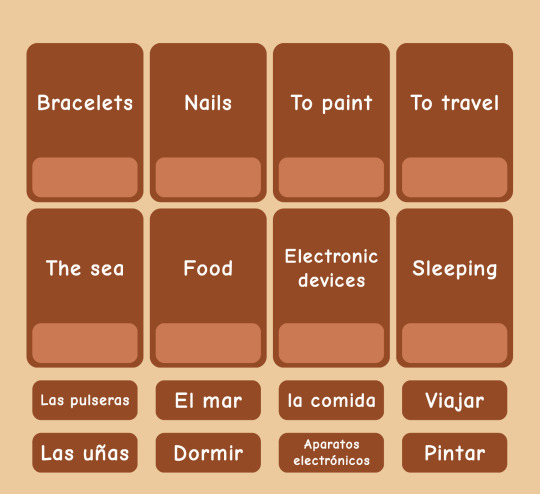
Practice your vocabulary skills with my ‘Basic word challenge’ second edition :) (Beginners - Elementary)
https://www.educandy.com/site/resource.php?activity-code=ba078
#spanish vocabulary#spanish language#learn Spanish#practice vocabulary#vocabulary games#Beginners#elementary
3 notes
·
View notes
Text
Basic words challenge - Vocabulary games 1
Practice your basic knowledge of Spanish with these vocabulary games (Beginner - Elementary)

https://www.educandy.com/site/resource.php?activity-code=ba058
10 notes
·
View notes
Text
Spanish Essentials; Tenses Masterpost
____________________________________________________________
El Presente
To be used when currently doing the activity
AR ER IR
o o o
as es es
a e e
amos emos imos
áis éis ís
an en en
Common Verbs, Irregulars and Stem Changers
· SER; soy, eres, es, somos, sois, son
· ESTAR; estoy, estás, está, estamos, estáis, estan
· IR; voy, vas, va, vamos, vais, van
· HACER; hago, haces, hace, hacemos, hacéis, hacen
· TENER; tengo, tienes, tiene, tenemos, tenéis, tienen
e.g. I speak
Hablo
____________________________________________________________
El Pretério
To be used the same as English simple past; ‘ed’
AR ER IR
é í í
aste iste iste
ó ío ió
amos imos imos
asteis isteis isteis
aron ieron ieron
Common Verbs, Irregulars and Stem Changers
· SER; fui, fuiste, fue, fuimos, fuisteis, fueron
· ESTAR; estuve, estuviste, estuvo, estuvimos, estuvisteis, estuvieron
· IR; fui, fuiste, fue, fuimos, fuisteis, fueron
· HACER; hice, hiciste, hizo, hicimos, hicisteis, hicieron
· TENER; tuve, tuviste, tuvo, tuvimos, tuvisteis, tuvieron
e.g. I spoke
Hablé
____________________________________________________________
El Imperfecto
To talk about something that ‘was’ happening
AR ER IR
aba ía ía
abas ías ías
aba ía ía
ábamos íamos íamos
abais íais íais
aban ían ían
Common Verbs, Irregulars and Stem Changers
· SER; era, eras, era, éramos, erais, eran
· IR; iba, ibas, iba, ibamos, ibais, iban
· VER; veía, veías, veía, veíamos, veíais, veían
e.g. I was speaking
Hablaba
____________________________________________________________
El Perfecto
To talk about something that has happened/ Can also be used to say I have just…
1) Use the present tense of HABER (to have)
HABER
he
has
ha
hemos
habéis
han
2) Form the past participle
AR-ADO ER-IDO IR-IDO
3) Place together
e.g. I have (just) spoken
He Hablado
____________________________________________________________
El Pluscuamperfecto
To talk about something that had happened
1) Use the imperfect tense of HABER (to have)
HABER
había
habías
había
habíamos
habíais
habían
2) Form the past participle
AR-ADO ER-IDO IR-IDO
3) Place together
e.g. I had spoken
Había Hablado
____________________________________________________________
El Futuro
to say I am going to…
1. Use the verb IR (to go) ; voy, vas, va, vamos, vais, van
2. Follow it with an ‘a’
3. Use an infinitive e.g. Hablar (to speak)
e.g. I am going to speak
Voy a hablar
____________________________________________________________
El Futuro
to say I will…
*These are added on to the infinitive*
AR/ER/IR
é
ás
á
emos
éis
án
Common Stem Changers
· HACER-Har+
· TENER-Tendr+
e.g. I will speak
Hablaré
____________________________________________________________
El Condicional
to say I would…
*These are added on to the infinitive*
AR/ER/IR
ía
ías
ía
íamos
íais
ían
Common Stem Changers
· HACER-Har+
· TENER-Tendr+
e.g. I could speak
Hablaría
____________________________________________________________
3K notes
·
View notes
Photo


I’ve noticed that Spanish students sometimes get confused by these words. So, let’s have a review on them!
➔ BIEN
Bien is an adverb, it means that it describes a verb.
bien = well
[verb + bien]
Mi mamá cocina muy bien. - My mom cooks very well.
Tienes que hacerlo bien. - You have to do it well.
No hablo español muy bien. - I don’t speak Spanish very well.
[bien + verb participle]
In this case, the verb has to be in participle.
Esta casa está bien construída. - This house is well built.
Me gusta la carne bien cocida. - I like the meat well cooked.
Quiero el trabajo bien hecho. - I want the work well done.
➔ BUENO & BUEN
Bueno is an adjective, it means that it describes a noun.
Buen comes from bueno. It is the same thing but it’s used in a different way.
bueno/buen = good
Adjectives have to match nouns, so they can also be masculine, feminine, singular and plural.
bueno (sing. masc.)
buena (sing. fem.)
buenos (pl. masc.)
buenas (pl. fem.)
When bueno is after the noun.
Él es un hombre bueno. - He is a good man.
Esa película es muy buena. - That movie is really good.
Estos zapatos son muy buenos. - These shoes are really good.
Las frutas son buenas para tu salud. - Fruits are good for your health.
When bueno is before the noun, it becomes buen.
Quiero leer un buen libro. - I want to read a good book.
Ella es una muy buena amiga. - She is a very good friend.
Necesito unos buenos pantalones. - I need some good jeans.
Luis siempre tiene buenas ideas. - Luis always has good ideas.
Notice that when the adj. goes after the noun, we can place verbs and adverbs in between. “Esa película es muy buena”
When the adj. is before the noun, we can’t divide them.
Extra:
Expression.
Sometimes we use bien as muy (very). It goes before an adjective.
La escuela está bien lejos de mi casa. - The school is very far from my house.
Esas flores están bien bonitas. - Those flowers are very pretty.
Estos libros están bien pesados. - This books are very heavy.
This use of bien is very colloquial, informal and natural in common conversations. For formal situations always use muy.
226 notes
·
View notes
Text
Objeto directo e Indirecto
Drag and drop the direct and indirect object pronouns:
Taken from Dream2languages
#indirect object pronouns#direct object pronouns#object pronouns#spanish#spanish language#learn Spanish#Spanish Teachers#spanish tutor
12 notes
·
View notes
Text
Why is Spanish so important in the world?
The guys from “Verne” have compiled in a beautiful infographic some relevant data about Spanish in the world:
17 notes
·
View notes
Photo

Although most words ending in "a" are feminine, well, as you might have guessed by now, certain words aren't. Other cases are: El programa, el tema, el lema, el idioma, el drama, el día, el enigma, el poema, and more!
#masculinegender#spanishlanguage#spanishlessons#LearnSpanish#spanishonline#spanishtutor#spanishteachers#spanish#spanish vocabulary#spanish words
69 notes
·
View notes
Text
Critics choice best Spanish language movies of all time
Newsweek Magazine has reviewed and compiled data from Rotten Tomatoes, Metacritic and IMDb to list the 50 best Spanish language films of all time. Here for you, the top 10:
(Spoiler Alert: four Luis Buñuel’s jewels made the cut.)
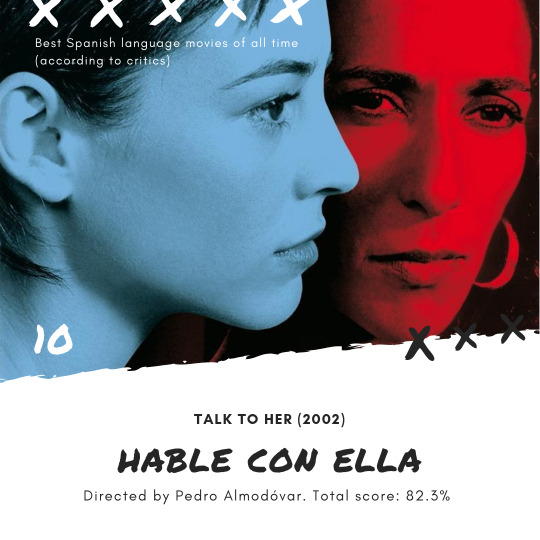


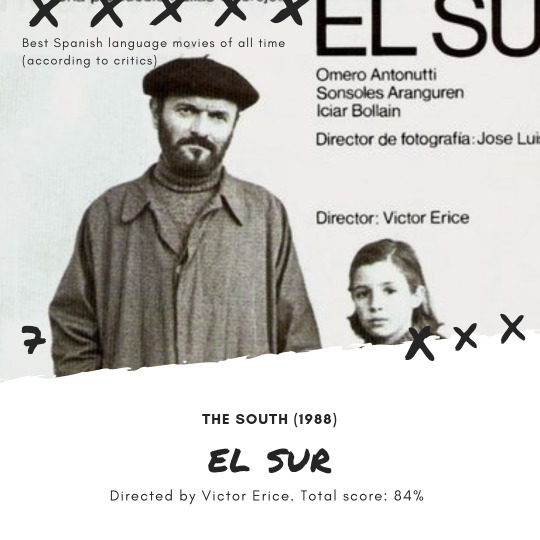
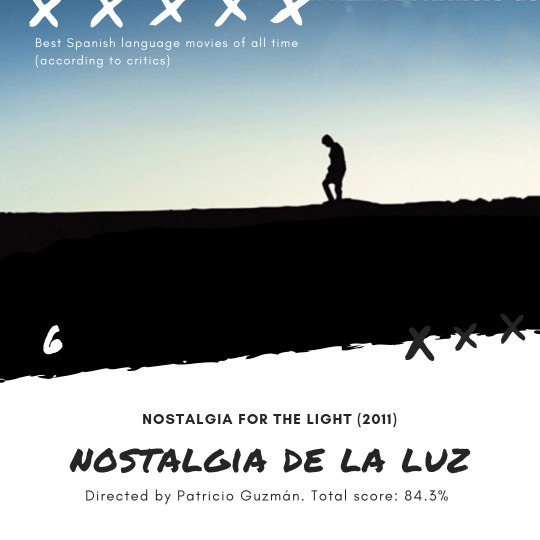
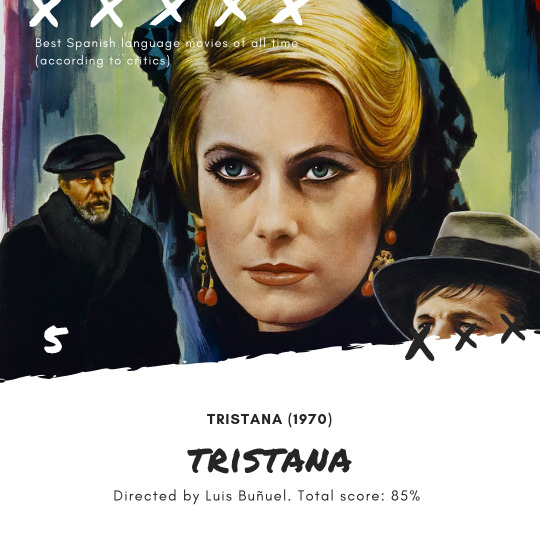
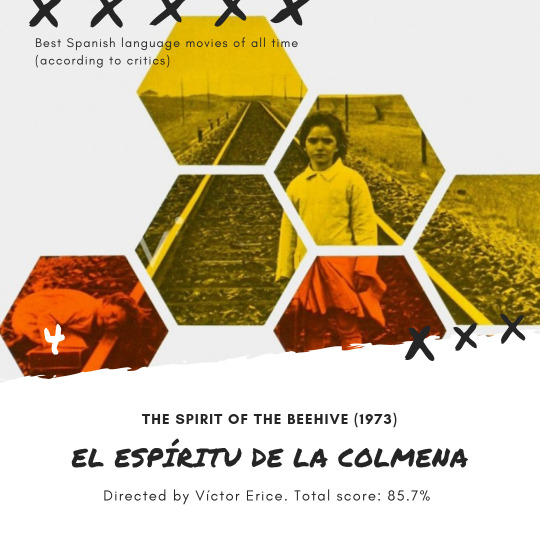
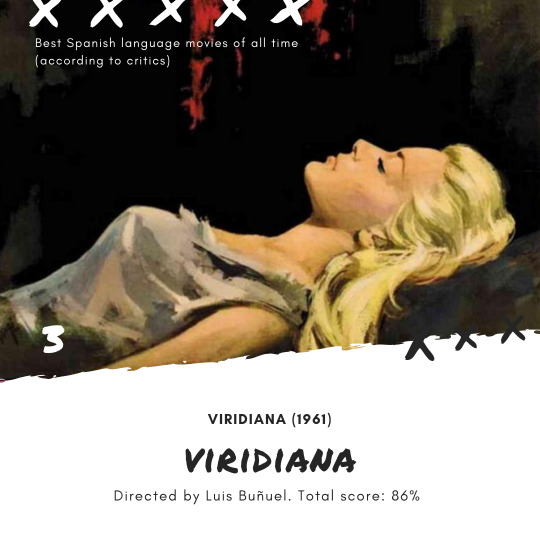
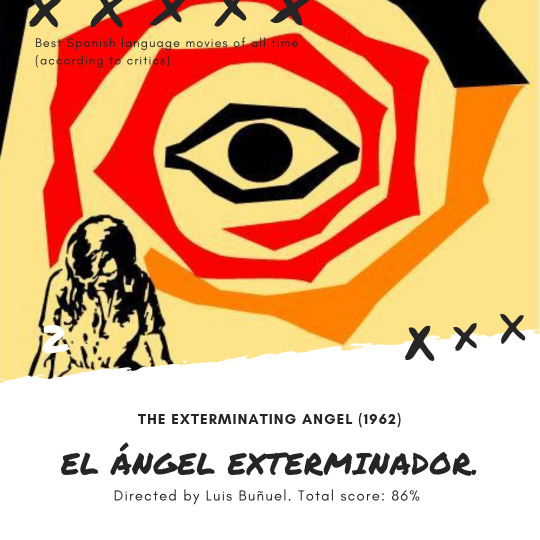

10. HABLE CON ELLA. Talk to Her (2002). Directed by Pedro Almodóvar. Total score: 82.3%
Summary: Two men share an odd friendship while they care for two women who are both in deep comas.
9. SIMÓN DEL DESIERTO. Simon of the Desert (1965). Directed by Luis Buñuel. Total score: 82.5% Summary: Simon, a deeply religious man living in the 4th century, wants to be nearer to God so he climbs a column. The Devil wants him come down to Earth and is trying to seduce him.
8. SOY CUBA. I Am Cuba (1964). Directed by Mikhail Kalatozov. Total score: 83%
Summary: Four vignettes about the lives of the Cuban people set during the pre-revolutionary era.
7. EL SUR. The South (1988). Directed by Victor Erice, Carlos Saura. Total score: 84%
Summary: Estrella, a little girl from Southern Spain, maintains a sentimentalized attachment to the region of her birth, an attachment manifested in her love for her father.
6. NOSTALGIA DE LA LUZ. Nostalgia For The Light (2011). Directed by Patricio Guzmán. Total score: 84.3%
Summary: Master director Patricio Guzmán travels 10,000 feet above sea level to the driest place on earth, the Atacama Desert, where atop the mountains astronomers from all over the world gather to observe the stars.
5. TRISTANA (1970). Directed by Luis Buñuel. Total score: 85%
Summary: Shortly after her mother's death, an innocent and youthful woman will find refuge into the household of her middle-aged aristocratic guardian, who will submit her to his sexual advances.
4. EL ESPÍRITU DE LA COLMENA. The Spirit of the Beehive (1973). Directed by Víctor Erice. Total score: 85.7%
Summary: In 1940, after watching and being traumatized by the movie Frankenstein (1931), a sensitive seven year-old girl living in a small Spanish village drifts into her own fantasy world.
3. VIRIDIANA (1961). Directed by Luis Buñuel. Total score: 86%
Summary: Viridiana, a young nun about to take her final vows, pays a visit to her widowed uncle at the request of her Mother Superior.
2. EL ÁNGEL EXTERMINADOR. The Exterminating Angel (1962). Directed by Luis Buñuel. Total score: 86%
Summary: The guests at an upper-class dinner party find themselves unable to leave.
1. EL LABERINTO DEL FAUNO. Pan's Labyrinth (2006). Directed by Guillermo del Toro. Total score: 88.7%
Summary: In the falangist Spain of 1944, the bookish young stepdaughter of a sadistic army officer escapes into an eerie but captivating fantasy world.
#Spanish language films#Films in Spanish#top 10 list#best#films#filmsinspanish#newsweek#learnspanish#spanishlessons#spanishonline#spanishtutor#spanishteachers#spanish#filmposters#filmisnotdead#cine#cinematography#luisbuñuel#almodovar#guillermodeltoro
90 notes
·
View notes
Photo

It's a common error to confuse ordinal numbers with fractions, especially "eleventh - 11th". The following sentences are correct:
Noviembre es el undécimo mes del año.
Anoche vi el undécimo capítulo de la serie Twin Peaks.
"Decimoprimero" is also valid.
#numbers#numbersinspanish#ordinal numbers#numeros#números#eleven#eleventh#11#learn spanish#spanish lessons#spanish language#spanish online#spanish tutor#spanish teachers#spanish
20 notes
·
View notes
Photo

I know you’ve seen it before so many times, but, believe me, it’s like it happens all the time unconsciously. “Actualmente” doesn’t work like “Actually.” Instead, it indicates the present of the person who speaks or writes (Now, at present.) Some sort of “Currently” :-)
#actualmente#actually#currently#adverbios#adverbsinspanish#falsecognates#learn spanish#spanishlessons#spanish language#spanishonline#spanish tutor#spanish teachers#spanish
34 notes
·
View notes
Photo

When you use verbs of opinion such as “creer, pensar, parecer” in the negative form they become expressions of doubt or negative opinions. In that case use subjunctive.
No creo que ‘tenga’ tiempo.
No pienso que ‘sea’ cierto.
No me parece que ‘esté’ bien.
#Spanish subjunctive#Subjunctive#Subjuntivo#doubt#negative#Spanish language#Spanish lessons#Spanish#spanish online#Spanish tutor#Spanish teachers#Learn Spanish
254 notes
·
View notes
Photo

The meaning of the word "orden" changes when it's feminine or masculine. El orden: "Arrangement or disposition of people or things according to a particular secuence, pattern or method." La orden: "Request to be made, supplied or served. Authoritative instruction to do something."
#el orden#la orden#spanish language#Spanish vocabulary#Learning Spanish#Teaching resources#spanish online#confusion#different meanings#order#instruction#request
42 notes
·
View notes
Text
Eres "viejoven" y lo sabes
Fundéu BBVA have reminded us about our age, or to be more specific, that sometimes we’re unsure if we’re young enough or old enough to call ourselves “viejo” o “joven”. It seems that the word “Viejoven” has been used for that exact purpose, that is, to identify ourselves and people somewhere in between.
Although not included in the Dictionary, this acronym (an abbreviation formed from the initial letters of other words and pronounced as a word) is understood as either 'Supposedly young person with old look or mentality' or 'elderly person trying to look young'.
Fundéu carried out a survey asking 400 people from different Spanish speaking countries which definition they followed and used.
The graphic above shows that actually age determines the acceptance of each meaning. From 108 people over 51 who responded to the survey, only 36.11% said that “Viejoven” means "young person who behaves and acts like an old one." Nationality was also key in the results, as people from Argentina, México, Chile and Venezuela among others were inclined to choose “old person who behaves and acts like a young one.”
(Taken from Fundeu.es)
9 notes
·
View notes
Text

Palindrome: A word, phrase, or sequence that reads the same backwards as forwards, e.g. madam or nurses run.
#spanish#español#learn spanish#spanish language#spanish vocabulary#Palindrome#Reconocer#Acknowledge#Recognize
24 notes
·
View notes
Text
México or Méjico?
The name of this great country has been written with an X since “Conquistadores” time (for over 5 centuries.) However, some people still write it with J and that is accepted but not recommended by RAE.
So, MÉXICO should be the one.
12 notes
·
View notes
Text

15 notes
·
View notes